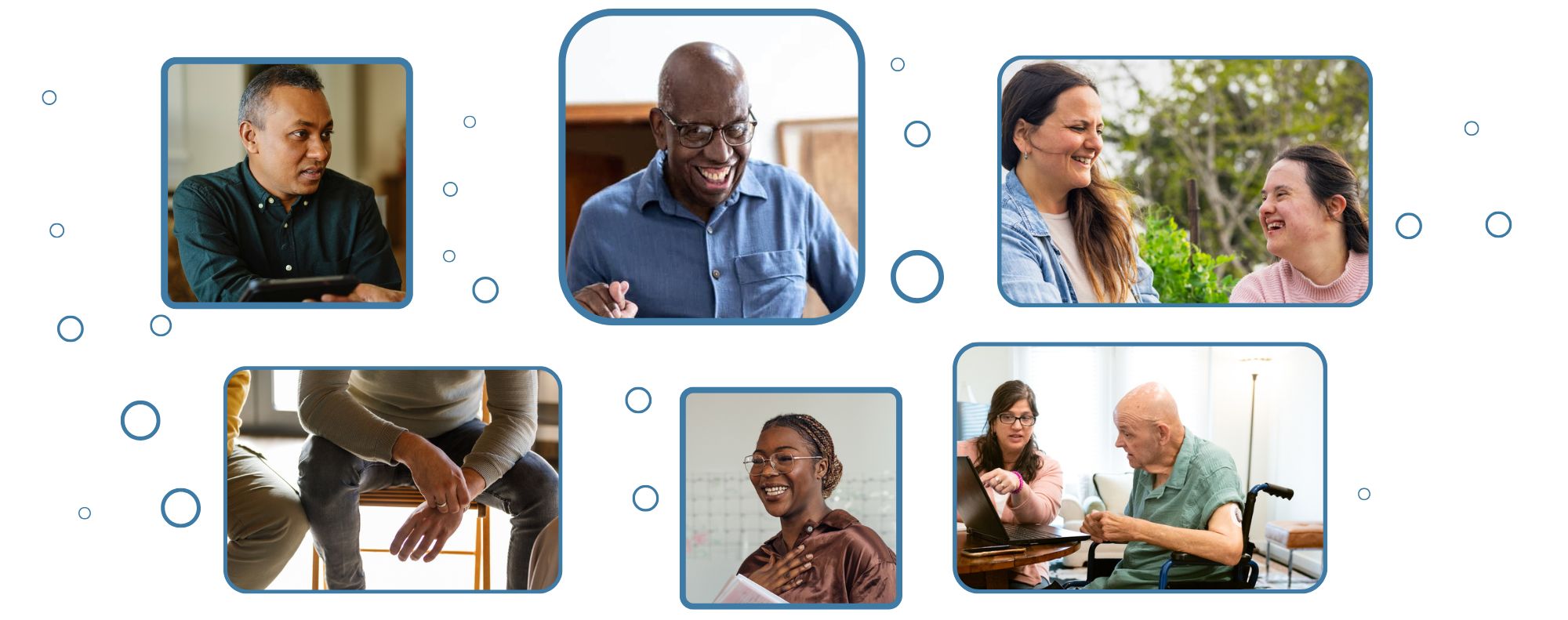2024-25 year in review
Published:
The Research in Practice review highlights our programme of work and impact across the sector.
Research in Practice work with and for professionals in the social care, health, criminal justice and higher education sectors offering resources, learning opportunities and specialist expertise.
We aim to support their learning to enable people – children, young people, families, adults, carers and communities – to live good lives. Our annual review showcases and demonstrates our work to support evidence-informed practice.
Scroll to explore

At a glance
'Our annual report comes at a challenging time for many, with a variety of pressures affecting people’s lives. The work of the children’s and adults’ sector has never been more crucial. We are proud to support professionals across the country to do their very best for children and young people, families and adults, against a backdrop of constrained resources and busy policy reforms.
Research in Practice has had another busy year, continuing to deliver high-quality and evidence-informed learning resources and opportunities to our network of Partners. As ever, we have blended expertise from practice, academia and lived experience to create extensive learning resources such as the Equity: Change Project, Pre-birth: Change Project and Staying in touch: Contact after adoption. We have enhanced our digital platform with a new iteration of Learning Pathways to provide accessible professional development for individuals and teams, and continued to improve our online offer.
New tools and resources have been developed for practice supervisors and leaders with the Reflective supervision: Learning Hub and the launch of our new Leadership Development Programmes to support supervision skills and critical thinking.
We feel fortunate to have led some valuable national projects this past year. We have continued to support the Principal Social Workers Network and provide administrative support for the Principal Occupational Therapists and the Approved Mental Health Professional leads networks. We delivered the Adult Social Care Leadership Programme and supported practice supervisors in NHS mental health settings.
Further work has included a partnership to deliver Department for Education reforms to social work, helping Ofsted explore the way vulnerability is conceptualised, supporting Social Work England to understand the emerging use of AI in social work practice, and exploring with the national Panel and local children’s safeguarding partnerships how to improve learning through safeguarding reviews.
We have now been part of the National Children’s Bureau family for over a year. In that time, we have been benefitting from our colleagues’ expertise, and working together in new areas. This has included collaborating on exciting new programmes to support the sector such as the Working Together with Parents Network, supporting professionals working with parents who have learning difficulties and learning disabilities.
As the world around us continues to change, it remains a privilege to support the workforce in meeting people’s needs.’
Dez Holmes, Director of Research in Practice


At Research in Practice everything we do is designed to equip individuals and organisations with the knowledge, skills and confidence to apply evidence in their work, improve outcomes and enable people to live good lives.
Our work brings together research evidence, practice wisdom and expertise from people’s lived experience. We do this by:
- Understanding the latest research evidence.
- Speaking to professionals across the sector about practice wisdom and current issues.
- Listening and learning from people's lived experience.
We then work with experts to create learning opportunities and resources on relevant topics; tailored to the learning needs of individuals and organisations.
As part of membership to Research in Practice, Partners have access to our comprehensive online library. This includes digital publications, podcasts, videos, learning hubs, and regular updates on the latest news, views, and case law. Our national programme of learning events, conferences and webinars support professional networking and development on pertinent social care topics.
In our short video, Dez Holmes explains how evidence-informed practice works.

We have now been a part of the National Children’s Bureau (NCB) family for over a year. During this time, we have shared our knowledge and experience and learned from new colleagues.
We were delighted to collaborate on the Working Together with Parents Network, supporting professionals working with parents who have learning difficulties and learning disabilities. The project is bringing together knowledge of adults and children’s social care. In addition, a research project by Research in Practice for the Department for Education on improving the outcomes of looked after children and young people in complex situations with multiple needs, at risk or subject to a Deprivation of Liberty. By working together, we were able to strengthen our understanding. This included drawing from NCB research for the Local Government Association on the drivers behind high-cost placements.
By pooling our understanding of complex needs with deeper insights we are better equipped to support the increasing complexity across adults and children’s social care.
‘Research in Practice has now been with NCB for over a year and we have been able to embark on exciting new programmes of work that have not only made NCB bigger, but also better. Bringing Research in Practice into the NCB family has allowed us to increase our contribution to practice and policy in areas such as safeguarding, anti-racism, and working with parents with learning disabilities. NCB has always been committed to improving the lives of young people making the transition to adulthood. Through Research in Practice, that commitment is further strengthened. We know that the lives of the people we serve do not neatly cut off at 18 or 25, so we don’t put this constraint around ourselves either. We take a wider view of whole course of a person’s life, with an understanding of the fundamental ways that childhood shapes this. Welcoming Research in Practice into NCB means that we are always working for better childhoods - and beyond.’
Anna Feuchtwang, Chief Executive Officer at National Children’s Bureau

Our Partner network steers our work - comprising of local, national and voluntary organisations, and universities across England.
‘Research in Practice has been consistent for the nine and half years I have been a Link Officer. The fact I have done so many years shows that they are a reliable and valuable resource to our borough and the research and development of our workforce. Any training that is delivered is of a high-quality, research evidenced-based and staff always come away impressed and eager for more learning opportunities. Research in Practice clearly pride themselves in recruiting the best facilitators who come from a wealth of experience, knowledge and accredited across the sector. Meaning you are receiving training and workshops from the cream of the crop. I have seen over the years change with the times to accommodate the changing world such as online delivery and revamping their website. The resources available online are great and give a variety of ways to engage in research and knowledge. They are a trusted and valuable organisation.’
Dominque Augustine, Link Officer, Harrow
Partner organisations have full access to our learning offer that includes events, conferences, digital publications, podcasts, videos, learning hubs, and regular updates on the latest research evidence, policy and case law.
Our growing university membership offers students, course leaders and researchers access to peer-reviewed publications, multimedia learning resources, engagement activities and support. We strive to support our Partners to work together – exchanging knowledge, learning and innovation across geographical or service boundaries. To facilitate this, each organisation has designated Link Officers who act as the vital bridge between Research in Practice and our network. They share ideas, connect colleagues and mobilise knowledge to their members.
Link Officers are indispensable in championing evidence-informed practice within their organisations. They take the lead role in making sure our offer is used as fully as possible to underpin practice, decision-making and achieve maximum impact. Each year our Link Officers’ Annual Meeting (LOAM) brings key colleagues together to consider the key issues they are facing. In 2024 we focused on collaborative working across the lifespan, acknowledging ten years of the Care Act 2014 and the Children and Families Act 2014.
Embedding learning and development
We support organisations to embed professional learning and development by offering an extensive national programme of events, online workshops, conferences and bespoke learning to meet organisational needs. We deliver over 800 events every year and our rolling programme of member engagement activities support Partners to access learning and development opportunities.
Our extensive menu of online learning workshops provide an effective and engaging way to deliver professional development directly to organisations. Designed in consultation with the Research in Practice network, the menu includes popular topics for practitioners and managers working with children, young people, adults, and families.
Our ‘Learn and deliver’ supports colleagues providing learning and development, to enhance their knowledge of learning theory, build online facilitation skills and develop their own bespoke learning sessions using Research in Practice resources.
Continuing professional development (CPD) enhances professional attributes, knowledge, understanding and skills. Our learning resources provide guidance of the recording, registration and regulation of CPD and support you to use evidence and to develop in your role.
The resources below support social workers and occupational therapists to maintain and record their CPD.
‘The quality and depth of the content available through Research in Practice is impressive. The materials are well-researched, thoroughly detailed, and presented in a manner that is both engaging and easy to understand. One of the most noteworthy aspects is the practical application of the information provided. The case studies, examples, and real-life scenarios included in the resources have helped staff to better understand complex concepts and apply them effectively in their work...the wide range of topics covered by Research in Practice have allowed staff to explore various areas of interest, broadening their knowledge and skills.'
Lisa Wallis, Link Officer, Southampton
Supporting practice supervisors and leaders
'There are so many benefits to reflective practice and we need leaders to support psychologically safe space/culture where reflective practices within teams is part of everyday practice, not just for an hour once a month. It's about slowing down, checking in with ourselves daily, creating a secure base in teams, peer group reflective spaces, having ample time to ground ourselves and reflect in one to one’s, with open and honest dialogue. These resources are so helpful for leaders, managers and all social workers/practitioners to really develop focused reflective practices.'
Research in Practice Partner
There is widespread agreement that practitioners in caring professions need supervision. In busy contexts, it is easy for reflection to be squeezed out and many practitioners say that they would like to reflect more. Practice supervisors and leaders can make a real difference. Our Reflective supervision: Learning hub contains practical tips and tools, learning from research and reflective questions that guide practice supervisors through the functions of supervision, and how to take a balanced, well-rounded approach.
Drawing upon and updating the rich body of materials we have built over the last decade the collection replaces the Practice Supervisor Development Programme (PSDP) website with many of the materials being updated and improved.
Effective supervision can improve critical thinking and decision-making skills, support with the emotional demands of practice and increase job satisfaction and staff wellbeing.
Reflective supervision: Learning Hub
An open access resource and tool hub to support practice supervisors and middle leaders who are responsible for the practice of others.
We have also launched new Leadership Development Programmes. The programmes are aimed at those who have responsibility for leading practice and supports the development of leaders through interactive workshops, small group reflective sessions and individual mentoring. The aim is to develop social care practice supervisors and leaders of practice with adults, children and families and their communities.
At this year’s Leaders Forum, we explored the case for making services fairer, not just more efficient, and considered how best to make the economic and moral case for social justice within public service reform. The annual event brings together Directors, Assistant Directors and strategic managers from across our network to debate key challenges and share solutions.
Building skills for effective practice

It is crucial to develop critical reflection and analysis skills to enable clarity over what evidence is being sourced and what factors influence advice, support and decision-making.
This year we launched our new iteration of Learning Pathways, providing multi-media modular learning that can be used by individuals and teams to support their development.
Social care practitioners make decisions that have a significant impact on other people’s lives. Our new Analysis and critical thinking pathway supports practitioners to reflect and build on core skills at the heart of social care practice. Modules cover professional curiosity, how to navigate uncertainty and risk and use research to inform assessments and recommendations.
Drawing together a wide range of content into accessible learning, the Learning Pathway can be used by individuals or teams, to build core skills that are at the heart of social care.
Critical reflection and analysis: Learning Pathway
Critical reflection and analysis are foundational to effective practice in social care. A new pathway explores this topic and aims to build on your skills and knowledge to inform your decisions.
As a newly qualified social worker (NQSW), using Research in Practice has been beneficial for me. This has aided in my academic development as it provided me with the accessible resources that helped me bridge the gap between academic and the real-world practice. The site supported me with evidence-based approaches and helped me feel more confident when applying research to informed decisions and interventions. It has been useful for my critical reflection and developing my professional judgement early in my career. What I do appreciate mostly is the ability to work through the training materials at my own pace through the podcasts, publications, and news. The content is clear, relevant, and linked directly to real world practice.
Newly qualified social worker – Surrey
While children’s and adults social care professionals often face distinct challenges from one another, they share many structural and organisational challenges.
They also have shared opportunities to develop and embed practice approaches that can be drawn on by professionals across both sectors to enhance the support provided to children, families and adults drawing on care. Areas include reflective supervision, appreciative inquiry and narrative practice.
These learning resources explore how to build good social work practice across children’s and adults.
Listen
- Anti-racist systems leadership
- Celebrating international social workers and supporting them to thrive in the UK
- Moving Social Work
- The importance of reflective supervision
- What is professional curiosity?
Read
- Addressing the safeguarding binary between youth justice and probation
- Appreciative Inquiry: Practice Tool
- Enhancing resilience in health and social care
- Promoting wellbeing through intergenerational solidarity
- The magic of Appreciative Inquiry
- Using intervision to improve practice
- Using a mentalising approach in social care: Frontline Briefing
- Using narrative practice in direct work with children, families, and adults: Frontline Briefing
- Working with parents with learning disabilities and learning difficulties
Watch

'Using Research in Practice supports reflective, evidence-informed practice across adult social care. They offer a rich library of resources — podcasts, briefings, Learning Pathways — that are accessible and relevant to the reality of social care practice. Whether it’s exploring legal literacy, trauma-informed approaches, or leadership development, the platform consistently helps us bridge the gap between research and practice.’
Fiona Havord, Principal Social Worker, Oxfordshire County Council
Developed in consultation with our national adults Partnership network our resources reflect the needs and priorities of the sector.
We work collaboratively on a range of partnership programmes that aim to innovate excellent practice and build capacity across the social care sector. We have created digital publications, podcasts, online resources and more on:
Equity and diversity
What practices, attitudes and actions are needed to overcome barriers, challenge oppression and increase equity? We need to ensure that people of all ages, with their diverse characteristics, have equality of opportunity and are not excluded or discriminated against.
Our Equity Change Project resources support systems change by exploring intersectionality, equity, allyship and justice in adult social care. Developed by academics, practitioners in adult social care, and people with lived experience, the project explored how intersectionality can help achieve equitable experiences and outcomes.
The resources below aim to enable you to think about how you can increase equity and change the system – whatever your role or position. In our short video, Meera Spillett outlines why we need anti-racist systems leadership.
Listen
- Anti-racist systems leadership
- Celebrating international social workers and supporting them to thrive in the UK
- Supporting work across cultures
Read
- Anti-racist social work in practice
- Delivering person-centred care for the UK's culturally diverse communities: Frontline Briefing
- Exploring identity and race in social work: A journey through oral histories
- Our rights, our future
- Using narrative practice in direct work with children, families, and adults: Frontline Briefing
- Working with parents with learning disabilities and learning difficulties
- Why intersectionality is vital to anti-discriminatory practice
Safeguarding adults
Safeguarding adults is about protecting adults who may not be able to protect themselves from abuse, and having regard for their wishes, views and feelings before deciding on any action. It is something that everyone needs to know about.
Our co-produced toolkit shares information, ideas and inspiration for anti-oppressive approaches to safeguarding adults experiencing homelessness. It explores how social justice movements can shape the support and services we offer.
These learning resources aim to support practitioners who work with adults to identify risks, build strengths and prevent harm.
Read
- Addressing the safeguarding binary between youth justice and probation
- Advocacy in safeguarding
- Changing the narrative on suicide
- Clarifying ‘ordinary residence’ under section 117 of the Mental Health Act
- Poverty and mental health practice - Making connections
- Radical safeguarding toolkit for homelessness
- The power of advocacy in safeguarding
- What is safeguarding adults? Brief Guide
Strengths-based working
Strengths-based working focuses on people's strengths, including their knowledge, skills and capabilities. By working in this way, it is possible to enable and empower individuals.
As part of our work on co-production we ran a workshop with people with lived experience of care services. It investigated the why, who, and how of co-production to improve outcomes. A key aim was to support professionals to become an advocate for co-production in their roles, building knowledge and confidence to work with people with lived experience across practice, service design and commissioning.
These learning resources explore the importance of embedding strengths-based approaches to build collaborative and hopeful relationships with adults drawing on care and support.
Listen
Read
- Adding value: Occupational Therapy
- Appreciative Inquiry: Practice Tool
- Empowering innovation in adult social care
- Enhancing resilience in health and social care
- Evidencing and empowering innovation in adult social care
- Social work with older people: Frontline Briefing
- Supporting practice with older carers: Practice Tool
- The magic of Appreciative Inquiry
- Using a mentalising approach in social care: Frontline Briefing
- Using intervision to improve practice
- Using narrative practice in direct work with children, families, and adults: Frontline Briefing
- Working with parents with learning disabilities and learning difficulties
Watch
Ten years of the Care Act 2014
It is ten years since the Care Act 2014 came into effect. The act was a catalyst for real change, paving the way for strengths-based practice, advanced adult safeguarding, and establishing carers as a fundamental resource. It also consolidated existing law relating to adults with care needs and emphasised the importance of wellbeing.
At the 2025 adults Partnership Conference, we heard from a diverse range of professionals who played a role in implementing that change.
In our short video, Sherrelle Parke provides an overview of the legislation.
‘Presenters and facilitators did well to get people away from negative themes - the usual themes of funding, lack of recognition, being unappreciated came up; however, they were reframed as opportunities and the focus came back on to people drawing on social care.’
Adults Partnership Conference delegate

‘My experience with Research in Practice resources has been overwhelmingly positive. The high-quality content, practical application, and user-friendly platform has significantly contributed to staff’s professional development. I would highly recommend Research in Practice to anyone seeking to enhance their knowledge and skills in their respective fields.’
Lisa Wallis, Link Officer, Southampton
Developed in consultation with our national children & families Partnership network our resources reflect the needs and priorities of the sector.
We also work collaboratively on a range of partnership programmes that aim to innovate excellent practice and build capacity across the social care sector. We have created digital publications, podcasts, online resources and more on:
Early childhood development
Every child’s development is influenced by multiple and interacting factors. These include internal, such as genetic factors, and external, such as family influences and wider cultural factors. For practitioners who support children and their families, a knowledge of developmental milestones can support effective assessments of children’s needs.
The following learning resources explore how a good knowledge of childhood development can support work with children, parents and families.
Read
- Exploring the impact of childhood violence through photographs
- For Baby’s Sake: Understanding the impact of domestic abuse on infants
- Insights from the national evaluation of A Better Start - a briefing for early years practitioners
- Learning about changes to attachment theory as a social worker
- National evaluation of A Better Start
- Social work and child development
- Social work and child development in the early and middle years (ages 0 to 11): Frontline Briefing
- Using attachment theory in children’s social care: Frontline Briefing
Watch

Our Staying in touch: Contact after adoption resource hub brings together a range of materials that can be used in the training and supervision of social workers and contact supervisors as well as in training adopters.
At the heart of the resources is the voice of lived experience of adopted children and young people and birth relatives.
You will find research briefings, practice guides, videos, case studies, and reflective exercises organised into key topic areas, and all are aimed at helping to support these important relationships.
Staying in touch: Contact after adoption
An open access resource hub for practitioners working with individuals to maintain meaningful relationships after adoption.
‘Brilliant to see these resources to support professionals working to support children who are to be or have been adopted. There are practical tools and videos/life stories shared to explore the range of options to help support important relationships for children as they grow up and their needs change. Thank you to all involved for updating and developing these materials.’
Research in Practice Partner
Read
- Contact: making good decisions for children in public law: Frontline Briefing
- Staying in touch: a planning tool for children in permanent families: Practice Tool
- Staying in touch – Changing our approach to contact after adoption
- Supporting meaningful contact in adoption, kinship care and foster care
Supporting pre-birth work
'This is exactly what is missing. Fills the gap between services and builds skills to support change.’
Research in Practice Partner
Despite concerning research from Born into Care in 2021 showing a rise in newborns entering care proceedings, pre-birth work remains one of the most neglected areas of social care.
There is a critical need for policy and practice changes to improve pre-birth support and assessment. To address this need our Pre-birth: Change Project brought together academics, practitioners and leaders in children’s social care to discuss local practices, procedures and protocols.
Pre-birth Change Project
The Pre-birth Change Project brought together academics, practitioners and leaders in children’s social care to discuss local practices, procedures and protocols in relation to pre-birth work.
This new resource supports services to improve their pre-birth support. It includes practical tools and guidance for service managers, strategic leads, commissioners, and frontline practitioners.
At the 2025 Children & families Partnership conference we explored the evidence on the scale of the issues and showcased positive initiatives from across the country to do better by and with these families.
Working with children, young people and families is at the centre of good social work practice. Social workers hold influential positions and while it is a fulfilling profession, the role can come with the heavy burden of expectation that we are agents of change. The weight of this perception can pressure social workers to pursue ‘perfect’ outcomes, which can unfortunately hinder realistic possibilities.
In Reframing social work - Expectation, reality and change, Richard Devine outlines how a different perspective on the role might liberate practitioners to better support the people they are working with and how practitioners can make effective changes to their practice. By reframing our approach we can improve relational practice and better support parents and families.
The learning resources below aim to support practitioners to build collaborative, purposeful and productive relationships in children’s social care.
Reframing social work - Expectation, reality and change
This online resource from Richard Devine outlines how a different perspective on the role of social worker might liberate practitioners to better support the people they are working with. Each section looks at a different part of social work and explores how we can make effective changes to practice.
Listen
Read
- Disabled Children's Social Care: Frontline Briefing
- Family group decision-making and the Children’s Wellbeing and Schools Bill
- Genograms: more than a family tree
- Promoting anti-racist practice across family justice
- Using genograms in practice: Practice Tool
- Working effectively with men in child and family social care: Frontline Briefing
- Working with parents with learning disabilities and learning difficulties
Voice of the child
Ensuring the voice of children, young people and families are heard is central to social care practice. This work requires meaningful engagement and direct involvement in decision making and service design.
These learning resources explore the importance of amplifying the voices of children and young people.
Listen
Read
- Child-centred communication in child protection: Practice Guide
- Enabling decision-making by children and young people with speech, language and communication needs - Four part: Practice Guide
- Responding to the care needs of separated children seeking asylum
- Using narrative practice in direct work with children, families, and adults: Frontline Briefing
Watch

‘The support from Research in Practice has been invaluable to our network. It provides us with the tools and resources we need to continuously improve and adapt, ensuring we can better serve the families we work with.’
Principal Social Worker
We work collaboratively on a range of partnership programmes that aim to innovate excellent practice and build capacity across the social care sector.
While each programme has a different focus – all aim to increase the use of evidence-informed, emotionally intelligent and systemic approaches. We are strongly committed to sharing these learning approaches widely and have made learning open access to enable all practitioners, researchers and people with lived experience of social care and the allied sectors of health, justice and education access.
This is an ever-expanding area of our work, and we continue to welcome approaches from all sectors to increase the use of evidence-informed practice. Programmes include:
Adult social care leadership programme
The Adult Social Care Leadership Programme was a learning programme to support the development of leaders working in adult social care.
The programme was commissioned by the Department of Health and Social Care and developed and delivered by Research in Practice. The evaluation of the programme comprised of participants’ feedback through surveys, an interview and focus groups. Participants were grateful to have attended the programme, keen to reflect on and share their learning, and felt other leaders would benefit from the programme too. The content about anti-racist practice was considered especially important, and attendees spoke of how this was supporting them to advocate for representation in their organisations.
Participants said that the programme made them feel ‘more self-aware' with increased ‘confidence and skills in challenging racist systems, processes, and people’. Two Principal Occupational Therapists reported feeling more equipped to ‘navigate in difficult settings where we’re less represented’.
Children’s Information Project
Lots of information is collected about the children and families involved with Children's Services, but this information is not always used to best meet the needs and interests of children, young people and families. Research in Practice is supporting the Children's Information Project.
The project, funded by the Nuffield Foundation, is an innovative collaboration between local authorities and universities to improve the way that information about and from children, young people and families is used in local and national Government. This information shapes and informs the support and services provided to meet and respond to the diverse needs of children, young people and families. A podcast from the project explores the single digital view of the child.

We have delivered the Child Safeguarding Practice Reviews – Learning Support Project (CSPRP) with the University of East Anglia (UEA), and the Vulnerability, Knowledge and Practice Programme (VKPP) to better understand how safeguarding partners deliver Local Child Safeguarding Practice Reviews (LCSPRs).
The project explored how high-quality learning can be gained from serious incidents to better protect children and young people and involve safeguarding partners from across the country, professionals and families with experience of review processes.
Read
- Exploring Local Child Safeguarding Practice Reviews
- How policing interacts with local safeguarding arrangements and LCSPRs
- Identifying and responding to child sexual abuse in the family environment
- Learning from serious safeguarding incidents and responding effectively to child mental health
- Making the Local Practice Review Process clearer for everyone
- Policing, child protection and domestic violence and abuse
Watch
ConnectED
ConnectED is a National Institute for Health and Care Research (NIHR) funded project that aims to help decision-makers in Adult Social Care make better decisions by growing their capacity to use research. The ConnectED partnership works to achieve this by helping social care managers and practitioners use research to make the best decisions they can, building research capacity and promoting co-production with people with lived experience, carers and practitioners.
Research in Practice has been supporting ConnectED with dissemination activities, which have included a large-scale conference in Bristol in 2024 and the development of a website to host all the learning resources, outputs and opportunities to engage in the project. We are developing a series of webinars to showcase the project learning in Autumn 2025.
Conceptualising vulnerability for Ofsted
In Ofsted’s response to the Big Listen, there is an ambition to increase Ofsted’s focus on how providers are meeting the needs of vulnerable children, learners and young people.
Ofsted has commissioned research on vulnerability and inclusion. Research in Practice, part of the National Children’s Bureau, is leading a project which aims to help Ofsted develop an evidence-informed conceptualisation of vulnerability and inclusion, for consideration in their inspection and regulatory work in education and children’s social care.
National Workload Action Group
Research in Practice supported the delivery of a National Workload Action Group (NWAG) that was set up as part of the government’s commitment to ensure a strong children’s social care workforce where social workers are supported and valued.
NWAG meetings brought together local authority representatives and key stakeholders in the social work sector. The group discussed the development of recommendations and solutions on reducing unnecessary workload drivers for child and family social workers.
Research and evaluation
We are a leading research and evaluation provider in Children’s and Adults Services, supporting providers to understand the impact that their services are having. Our evidence-informed approach is central to research and evaluation, and we weave research evidence, professional expertise and the views of those with lived experience throughout our evaluations.
Our evaluations this year have included working with organisations including Barnado’s, Youth Endowment Fund, Ofsted, the Peninsula Adult Social Care Research Collaborative and a specialist autism team in children's social care. We have also supported the development of practice supervisors working in adult social care. Commissioned by the Department of Health and Social Care, the content on equity, diversity and inclusion and anti-racist practice was considered especially important. Attendees spoke of how this was supporting them to advocate for representation in their organisations.
We review and analyse internal data and sources of information to inform our annual topic consultation with our Partner network. All Partners will be invited to share their priorities to inform our resource development.
Rethinking domestic abuse in child protection
Rethinking domestic abuse in child protection: responding differently (RDAC) is a collaborative project, funded by Nuffield Foundation. The project aimed to address gaps in our knowledge on the nature and characteristics of domestic abuse and violence in child protection situations.
Watch
Read

We are delighted to continue to support the Principal Social Workers (PSW) Network. We work closely with the network Chairs and co-chairs to provide administrative support, host events and ensure communications reach PSW network members through regular bulletins, social media posts, and a dedicated Teams channel. Our annual conference also brings our PSWs together to share best practice.
As a network and as individuals working at organisational, regional and national levels, PSWs hold unique and vital insights into the demands the profession faces, and the hands-on expertise on leading practice, even in the most challenging times. We are also pleased to continue to provide administrative support to the Principal Occupational Therapists network and the Approved Mental Health Professional leads network.
Social Work England and Artificial Intelligence
We are working with Social Work England to find out more about how artificial intelligence (AI) is being used by social work employers and social work educators in social work education and practice.
Our aim is to explore the emerging use of AI in social work education and practice in England. Social Work England is responsible for regulating social workers in England, ensuring high standards of practice and conduct, and ultimately improving people's lives and communities.
Keeping you informed
To keep informed with our latest news and information follow us on Bluesky and LinkedIn.
Partners also receive regular email bulletins on the latest research evidence, policy announcements and more – tailored to children and families or adults social care practice.
To subscribe to our Partner bulletin, sign in to your account and select 'Contact preferences' on your dashboard. If you are not a member of Research in Practice and wish to find out more please visit our membership pages.

Ensure you are following Research in Practice on social media and have signed-up to our bulletin to hear about the latest news and information from Research in Practice.
If you have any questions or comments please contact us for further details and we will get back to you as soon as possible.

